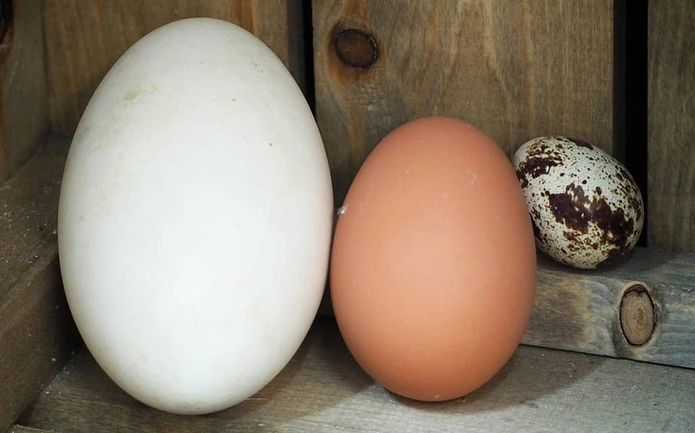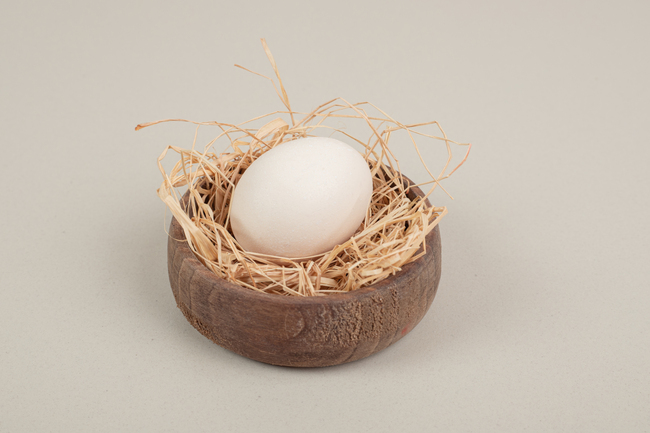Is it good for pregnant women to eat goose eggs? When is the best time to eat them?
Many Vietnamese mothers-to-be are familiar with the traditional belief that eating goose eggs during pregnancy is beneficial for both the mother and the baby. But is this true? Are goose eggs as good as people say? This article will help you verify the nutritional value of goose eggs and answer related questions scientifically and with a solid foundation.
Nutritional Value of Goose Eggs

To answer the question objectively, let’s compare the nutritional composition of 100 grams of goose eggs and 100 grams of chicken eggs to get a better understanding. Follow the table below:
|
No. |
Nutritional component | Nutritional content per 100 grams of goose eggs |
Nutritional content per 100 grams of chicken eggs |
| 1 | Protein | 13 grams | 14.8 grams |
| 2 | Vitamin A | 360 micrograms | 700 micrograms |
| 3 | Vitamin B2 | 0.3 milligrams | |
| 4 | Lipid | 14.2 grams | 11.6 grams |
| 5 | Iron | 3.2 milligrams | 2.7 milligrams |
| 6 | Calcium | 71 milligrams | 55 milligrams |
| 7 | Phosphorus | 210 milligrams | |
| 8 | Vitamin B1 | 0.15 milligrams | |
| 9 | Vitamin B12 | 1.29 milligrams | |
| 10 | Vitamin PP | 0.1 milligrams |
The table above lists the 10 nutritional components with the highest proportion in the eggs for comparison. You can see that goose eggs contain more of these components than chicken eggs. However, the amount of each component per 100 grams of goose eggs and chicken eggs differs significantly, making it easy for you to observe and compare.
Is it good for pregnant women to eat goose eggs?

Goose eggs are rich in protein, lipids, vitamins A, B1, B12, PP, phosphorus, calcium, and iron, among other nutrients. Each component has its own effects on the pregnant woman’s body. Let’s take a look at the positive and negative effects of goose eggs on pregnant women:
Positive effects
With its nutritional composition, goose eggs provide many benefits for pregnant women. Some of these benefits include:
- Preventing colds: Goose eggs provide energy, which helps strengthen the body and reduces the risk of catching colds.
- Boosting the immune system: Certain vitamins and minerals in goose eggs help pregnant women improve their immune system.
- Improving memory: Due to hormonal changes during pregnancy, many mothers experience memory loss and irritability. Eating goose eggs in the morning can help improve this condition quickly.
- Improving skin appearance: Goose eggs contain albumin, which helps improve skin elasticity, reduce acne and dark spots. You can use egg whites as a face mask.
- Helping with blood production: Goose eggs contain iron, which is essential for preventing iron deficiency anemia in pregnant women.
Negative effects
In addition to the positive effects mentioned above, eating goose eggs during pregnancy also carries potential risks:
- Goose eggs are high in cholesterol and lipids, which can be harmful to the cardiovascular system of pregnant women.
- Eating too many goose eggs can increase the risk of developing diabetes, lipid disorders, high blood pressure, weight gain, and other health problems.
- Goose eggs have a lower nutritional content compared to other types of eggs. For example, goose eggs have lower nutritional value than chicken eggs. However, goose eggs are more expensive than chicken eggs.
In conclusion, while goose eggs contain beneficial nutrients for pregnant women, they are not nutritionally superior to other types of eggs and might even have lower nutritional value. No research has confirmed that goose eggs have a positive effect on the health and intelligence of the fetus. Experts recommend that pregnant women increase their intake of foods rich in DHA, choline, and folic acid to help their babies develop intelligence.
Therefore, we should not overhype the benefits of goose eggs and encourage pregnant women to consume them excessively, which could lead to adverse effects.
Things to keep in mind for pregnant women when eating goose eggs

When is the best time to eat goose eggs during pregnancy? What should you keep in mind when eating them? To maximize the benefits and minimize the risks of eating goose eggs improperly, pregnant women should note the following points:
- Pregnant women should consume goose eggs during the mid-pregnancy period, specifically in the 4th, 5th, and 6th months of pregnancy.
- Pregnant women should not eat goose eggs too often (no more than 3 times a week). They should also avoid eating too many goose eggs at once.
- Pregnant women with high blood pressure, liver disease, diabetes, obesity, edema, and cardiovascular problems should avoid eating goose eggs.
- Always eat cooked goose eggs.
- It’s perfectly fine for pregnant women to not eat goose eggs at all. Instead, they should focus on supplementing other essential nutrients for their health and the baby’s development.
This article has addressed the questions: Is it good for pregnant women to eat goose eggs? When is the best time to eat them? Hopefully, with this information, you have a better understanding of how to take care of your pregnancy health. Remember, if you can’t eat goose eggs, you can substitute them with chicken eggs or other essential nutrients without worrying.
